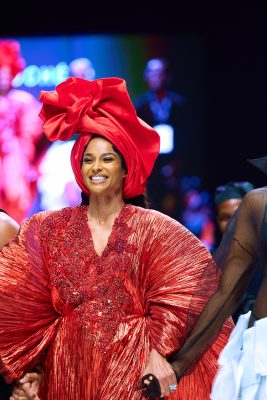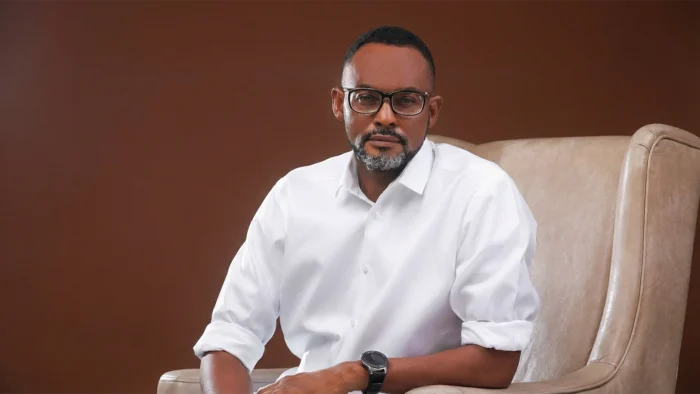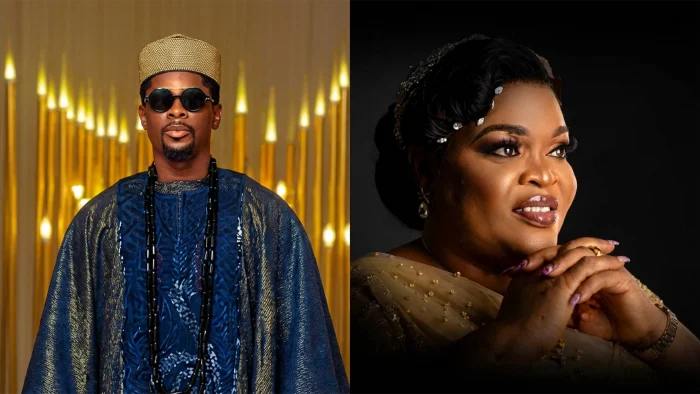With his debut EP I Wish I Had More Time, Braye blends reggae, soul, and jazz into a heartfelt sound steeped in storytelling. From Port Harcourt to Accra, he’s crafting music that reflects philosophy, personal history, and a refusal to be boxed in.
Braye, born Okiakpe Braye Frank, is carving a space within Afrobeats with his fusion of reggae, soul, and jazz. His discography reads like a memoir, exploring themes such as existential crisis, perseverance, self-discovery, and unrequited love. The four-track record brims with energy and creativity.
For the Port-Harcourt native, making music is a continuous learning curve. His musical influences range from Drake, Kendrick Lamar, and J Cole to Frank Sinatra, Freddie Hubbard, Bill Evans, Keith Jarrett, and Ray Charles. Hiscreative approach keeps him grounded in innovation, a bold marker behind his work, from his earlier records, Bossa Nova, Painless Melody, among others, to his latest opus. “My music is a gift from God; I don’t overthink it when I freestyle; I just free my mind,” he tells Guardian Music.
With heartfelt poetry, fluid fusions, and bold compositions, the engineer-turned-singer is reintroducing jazz to a new Nigerian audience. In this conversation with Guardian Music, Braye discusses his creative process, his journey from his mother’s stall to university in Accra, and the inspiration behind his debut project.
When did you discover your love for music?
I’ve been doing music since I was a kid. At the time, I didn’t feel like I had a special talent for it; I just liked it. Every Children’s Day, I would sing, while others performed Bible verses, acted, or danced. I loved listening to John Legend; I listened a lot to what the adults in my house played.
At 12 or 13, I started writing music, just to be creative. As I grew older, people encouraged me by telling me that I did quite well with it. So, I just continued. I don’t think about music the same way anymore, though. I have had people tell me that my music style is not really Nigerian. They often ask, “How do you sell that?” However, at the end of the day when music becomes personal enough to you, you feel like ‘This is my personality, and this is my life,’ and this is how I want to live. Making my kind of music is tied to how I want to live.
Where did you grow up?
I grew up in Port Harcourt till I was 15, and then I went to Accra for university. I studied Instrumentation Engineering, which is more like applied electronics, designing circuits. You learn about instruments and machines, and how to control, design, and preserve them.
Did you ever think of working full-time doing that?
Yes, I did. I was even going to do my master’s at some point. When I got to the final year, it got more serious and it became more interesting to me. There is a part of me that likes to create stuff. I built a machine for my final year project; it was something that required using a load cell, which measures weight.
It is really useful to manufacturers, especially in preventing scenarios where some products are not evenly filled up with the others, for instance while packaging detergent or anything similar; it would help in ensuring they are all packed evenly. So, when it gets to the end of the production line, before the product goes to final packaging, the machine checks the weight of what is packaged and compares it with the weight of what was supposed to be packaged. It was an idea that I got while working in my mom’s drink store in Port Harcourt because, sometimes, some drink packs are half empty.
Tell us how you honed your music style.
Most of what I make, generally, are influenced by what I listen to often. There was a time when I listened a lot to Kendrick Lamar and J Cole, and I was even told that I started to sound like them. As time went on, I listened to a lot of Big Sean, Drake, and Migos, especially when I was 17 years old.
Then I later got back to listening to music that my dad played while I was a kid, especially country music, and that was how I discovered jazz. I also discovered instrumental music, including music from saxophonists like Stan Getz, trumpeters like Freddie Hubbard, and pianists like Bill Evans or Keith Jarrett. I listened to a lot of music, and sometimes I’m overjoyed when I meet people who listen to the same stuff that I do.
While growing up, I also read a lot of fiction and started writing fictional stories at some point. My dad resisted the idea of me doing music, so I thought he would accept me better as a fiction writer. After my National Youth Service in Port Harcourt, I used to read from 6 PM till midnight, binging on the greatest novels that I could find, from Tolstoy to Dostoyevsky. I also read Russian, European, and South American literature. That experience showed me the importance of stories, and how a story can evolve and give different messages depending on its reader.
Now, that has shaped how I think about music, even in instrumental music where there are no lyrics; in the arrangement, sometimes there’s tragedy and then, sometimes, there’s comedy; in the pace, with the way it flows and stops; in the intensity of the sound and the notes; and in the speed and the rhythm.
It just feels like the character in a story. The rhythm is a character, and the melody is like the emotion of it. Thinking from that perspective helps me feel like I know what I’m doing. That’s how I think I make the kind of music I make. It’s just fun to create, and the fact that I have the opportunity to do it for a living just makes me even more grateful.
Tell us more about the songs that shaped your childhood.
My most listened to artist is probably Ray Charles, although most people wouldn’t say Ray Charles is a jazz artist; he is a mix of a lot of things. When Ray Charles started, people saw him as a genre bender. I also listened to Nat King Cole, Frank Sinatra, Sammy Davis, and Dean Martin, whose music I really appreciated.
There were even people from different countries, like Luis Prima, who was Italian. I also listened to Bossa Nova from Brazil, binging on people like Caetano Veloso, Antonio Jobim, and many others. I really appreciated their music because I felt it. It felt like I could connect to them without even knowing the meaning of their lyrics.
Walk us through your typical creative process.
Well, there are different ways it can go. Sometimes I start with a line and build a whole song from it. Most of the time, though, I start with the instrumentals; so, I have a session with a producer and we develop an idea into a beat. Then, I take the beat home, listen to it, do a couple of freestyles, and pick melodies that I want to use. Sometimes, in those freestyles, I can have a line that makes sense to me, and I build from there.
This music is a gift from God, and I try as much as possible not to overthink; I just free myself and my mind. When I start freestyling, I usually don’t know whether I’m going to be happy about it or if it is something that’s going to get me frustrated. When I get a good line, I’m overjoyed; I’m jumping around the house, because I always know when I get a good line!
What was the core message in I Wish I Had More Time?
The song itself came from a music camp in Accra. I met Michaël Brun at that camp, and we played chess. The next day, I met him at the studio and I played him Bossa Nova, because at that time, I had recorded the song, but it wasn’t mixed and mastered. During one of the breaks from his session, we came up with the raw idea for I Wish I Had More Time in about 10 minutes. Then I took it back to my apartment, and my producer Duke, who also made the other songs on the EP, finished the whole beat for that song. Then, I started writing it.
When I was writing it, I was just thinking of the song by itself. I wrote the second verse one year after we recorded the first verse. I was trying to talk about desire, and how, sometimes, when we get our desires fulfilled, we find out that this is not really what we actually wanted. So it’s just the anti climax of life, of relationships. And then the other songs were aligned with the theme of self belief and confidence. Some talk about nostalgia and desire. So, on all the songs, there’s a perspective on desire and its anti-climax. It is basically saying, ‘I wish I learned more. I wish I was more patient with life,’ because everything depends on time, even music.
Do you think you might explore more fusions in the future?
I don’t know, honestly, and I feel like that’s what makes my work worth it. I follow what calls to me. Back in school, I spent a lot of time alone, so I wasn’t really influenced by the music that other people considered popular. I always just researched my own taste in music. At some point, I grew to love a certain kind of music, and I still find people who understand music in the way that I do.
I’m still making new stuff at this point. I’m presently trying to make a collection of songs for another project that I might drop next year. I like to fit in with whoever I’m working with. Our personalities and the choices we make in deciding our melodies show in the music. So, I like for that spontaneity to happen rather than deciding on what I want to make.
Are you looking to collaborate with other Nigerian singers?
I am not really looking, but I’m happy. I just haven’t actively worked towards it. I have Wizard Chan on my radar; we grew up together, and his house is opposite mine in Port Harcourt. When I came to Lagos, in 2022, I lived with him.
There’s a song we made when we both just came to Lagos, and were still homeless, and I want to release that song at some point in the future as part of an album or something. I feel like the world should hear this. I don’t reject collaborations. I just don’t actively pursue them. I am more concerned with giving people a genuine piece of work that’s pure and represents a piece of me.
What are your favourite pastimes?
When I’m not making music, I’m reading because I’m still interested in writing fiction. I don’t want to mix that up with the music. In the end, all we do in music is tell stories. I want to mix as many elements in the art field as I can. So, if I’m not doing music, I’m reading my favourite authors such as Naipaul, Dostoyevsky, or Tolstoy; and I also read some art books.
I have an art book collection in my house that keeps getting bigger. I also like to cook. I can do a lot of stuff by myself, because I started living alone at age 15, and I had to do all these things from a tender age. I also enjoy watching TV series or documentaries. At some point I’ll go back to doing more research work in engineering too.
Finally, what is your vision as Braye?
If I can always have the resources I need to keep building my ideas, I want to continue making music, and drive the culture forward with my music, my art, and my capacity to express feelings, tell stories, dance, and move. I just want to feel the world and put it in my work. That’s my touchstone.








